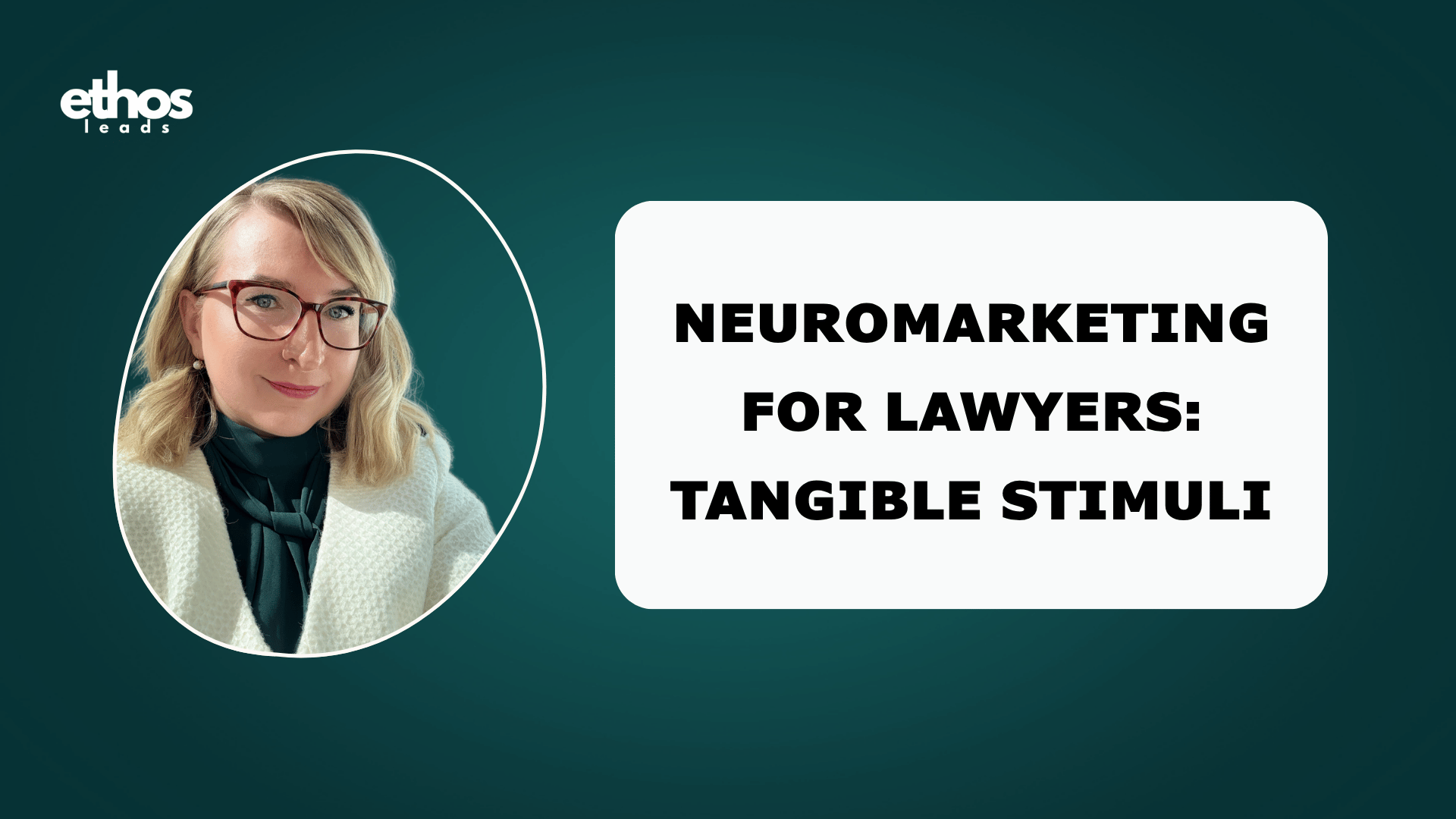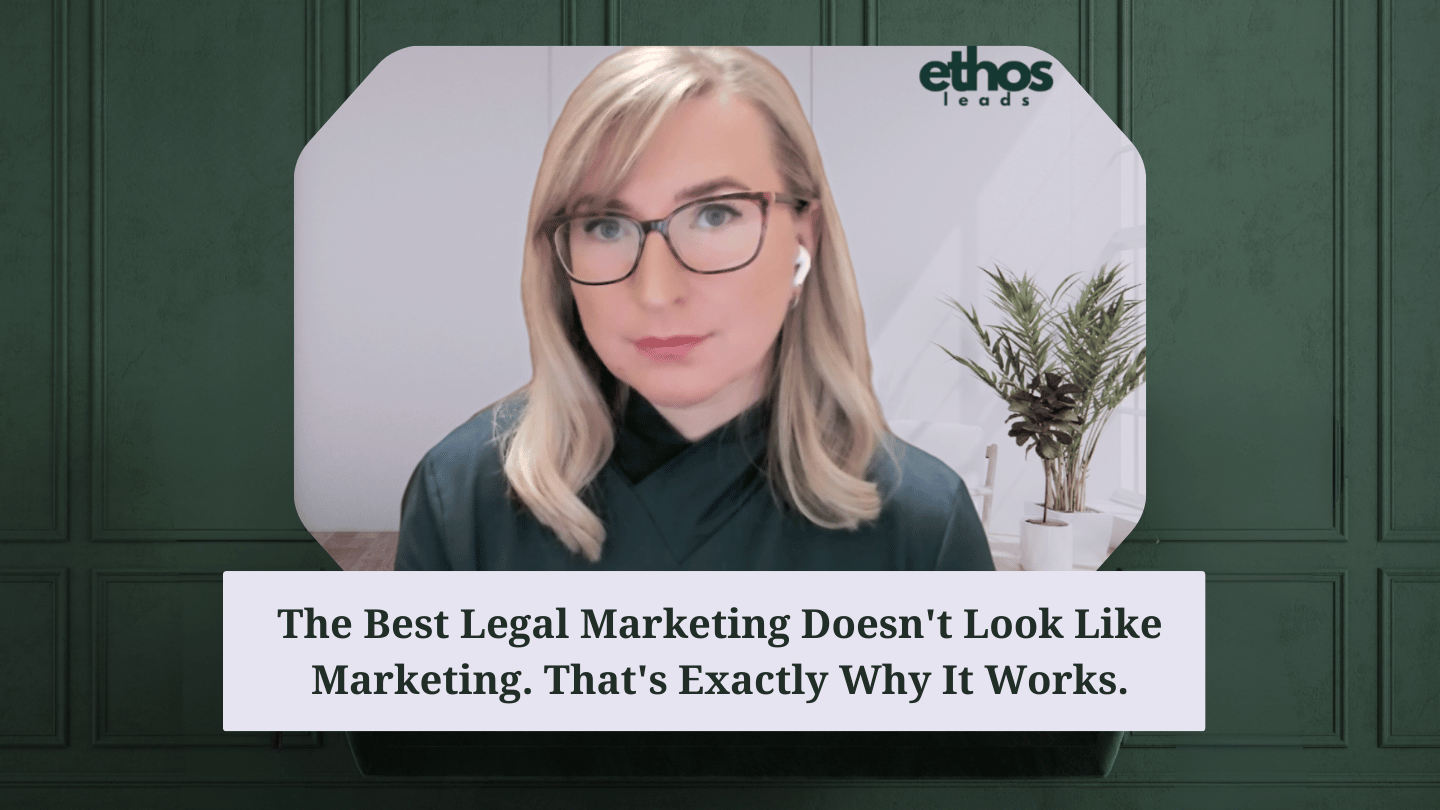Neuromarketing for Lawyers: Tangible Stimuli
Understanding Your Legal Clients' Pain Points
Your potential clients aren't making rational, calculated decisions about legal services. Instead, their primal brain, the ancient part of the brain responsible for survival, acts as the first filter for all incoming information. This primitive decision-maker operates on speed and simplicity, not logic and analysis.
Your potential clients' primal brains are constantly asking: “Is this worth my mental energy?”
If your message appears complicated or abstract within the first few milliseconds, it will likely be rejected before their rational brain even has a chance to evaluate your credentials or expertise.
Legal problems are stressful enough on their own. When someone seeks a lawyer, they’re often facing confusion, fear, or urgency. The last thing they want is to wade through jargon, lengthy explanations, or abstract promises.
Clients want clarity:
- “What does this mean for me?”
- “What will happen if I hire you?”
- “How will my life improve if I choose your firm?”
According to Christophe Morin and Patrick Renvoise in The Persuasion Code, messages that are tangible, simple, and easy to process stick with the brain far better than abstract or complex ones.
Legal clients typically arrive at your doorstep in one of two states: crisis mode or prevention mode. In crisis mode, they're overwhelmed, stressed, and seeking immediate relief. They don't want to decipher complex legal jargon or navigate through abstract concepts about jurisprudence. They want to know, in the simplest terms possible: "Can you solve my problem?"
In prevention mode, clients are planning ahead but still don't want to invest significant cognitive energy in understanding legal complexities. They want clear, straightforward answers about how you can protect their interests.
Whether dealing with divorce proceedings, business disputes, estate planning, or criminal defense, your clients share common desires: clarity, confidence, and quick understanding of how you can help them.

The Power of Tangible Stimuli in Legal Marketing
Making your legal services tangible means achieving simplicity and minimizing the cognitive energy necessary for potential clients to process your message. This isn't about dumbing down your expertise, it's about making your value immediately apparent and accessible.
Consider this principle: you're not just competing against other lawyers; you're competing for your audience's attention against every other stimulus in their environment. The primal brain guards cognitive energy like a precious resource, and before you can sell your legal services, you must first sell the value of using their mental energy to process your message.
Think about the idiom “paying attention.” Attention requires energy, and our brain doesn’t like to spend it unless necessary. That means:
- Complex, abstract messages = rejected quickly.
- Simple, concrete messages = processed easily.
As Morin and Renvoise explain, “Nobody will ever complain that your message is too easy to understand.” But they will tune out if it’s too abstract, confusing, or demanding.
For lawyers, this means legal communication must be tangible, clear, and client-centered.
Why Tangibility Matters for Lawyers
Law is full of abstract terms: “litigation strategy,” “compliance solutions,” “asset protection.” While accurate, these phrases are meaningless to someone in crisis.
The tangible stimuli principle reminds us:
- Clients don’t want to learn legal theory, they want solutions to personal, real-world problems.
- If your message feels like hard work to process, the primal brain shuts it out.
- Tangible communication reduces anxiety, builds trust, and accelerates decision-making.
How to Apply Tangible Stimuli in Legal Marketing:
Here are three powerful ways to make your law firm’s messaging more tangible.
1. Use Analogies and Metaphors
Analogies help clients grasp unfamiliar legal concepts quickly by linking them to something they already know.
Instead of: "We provide comprehensive estate planning services including will preparation, trust establishment, and probate administration."
Try: "Think of estate planning like building a bridge for your family's future. We construct that bridge so your loved ones can safely cross over financial obstacles when you're no longer there to guide them."
Instead of: "Our firm specializes in complex business litigation involving contract disputes and breach of fiduciary duty claims."
Try: "When business relationships break down, it's like a house with a cracked foundation. We're the structural engineers who assess the damage and either repair the relationship or help you build something stronger."
Analogies make abstract law relatable and concrete.
2. Connect to Familiar Situations and Experiences
Your potential clients may not understand legal procedures, but they understand everyday situations. Bridge the gap between legal complexity and familiar experiences.
For Personal Injury: "Getting fair compensation after an accident shouldn't be harder than the accident itself. We handle the insurance maze so you can focus on healing."
For Divorce: "Divorce is like untangling two lives that have grown together. We're skilled at separating what's yours while protecting what matters most to you."
For Business Formation: "Starting a business without proper legal structure is like building a house without a foundation. We lay the legal groundwork so your business can weather any storm."
3. Provide Concrete Evidence Over Abstract Claims
The primal brain is skeptical of abstract claims. Back up your promises with numbers, proof, and real-world outcomes.
Replace vague promises with specific, observable proof points that demonstrate your value.
Instead of: "We achieve favorable outcomes for our clients."
Try: "Last month, we secured a $2.3 million settlement for a client who was told their case was worth 'maybe $500,000' by another firm."
Instead of: "We handle complex cases."
Try: "We've successfully defended three Fortune 500 companies against federal investigations, and none of our clients has ever been indicted."
Concrete evidence makes your message credible and tangible.
Implementation Strategy
Start by auditing your current marketing materials:
- Identify every abstract concept or legal term.
- Replace each with a concrete analogy or familiar comparison.
- Add specific evidence wherever you make claims.
- Test your revised messages with non-lawyers to ensure clarity.
The goal isn't to eliminate all sophisticated legal thinking from your practice, it's to ensure that your initial communications pass through the primal brain's filtering system so your rational arguments have a chance to be heard.
Key Takeaways
To engage the tangible stimuli of the primal brain, remember:
- Make it simple. Avoid legal jargon. Use everyday words.
- Make it relatable. Use analogies and metaphors clients understand.
- Make it concrete. Back claims with facts, numbers, or case outcomes.
- Make it effortless. Reduce the “cognitive load” for your audience.
The goal is cognitive fluency, i.e., messages that feel easy to understand and act upon.
In the attention economy, simplicity is sophistication. The most successful lawyers aren't necessarily those with the most complex legal theories, they're those who can make complex legal solutions feel simple and accessible to clients who are already overwhelmed.
By making your legal services tangible through analogies, familiar situations, and concrete evidence, you're not just improving your marketing metrics. You're building trust, reducing client anxiety, and positioning yourself as an advocate who truly understands both the law and the human experience of needing legal help.
Your clients' primal brains are constantly evaluating whether you're worth their precious cognitive energy. Make that decision easy by ensuring your first impression is one of clarity, simplicity, and immediate value. In doing so, you'll not only attract more clients but serve them better from the very first interaction.
Related Articles:
Neuromarketing for Lawyers: An Ethical and Practical Guide for Solo and Small Law Firms
Neuromarketing for Lawyers: Personal Stimuli
How Personal Stimuli Convert More Clients
Neuromarketing for Lawyers: Contrastable Stimuli
Neuromarketing for Lawyers: Tangible Stimuli
Neuromarketing for Lawyers: Memorable Stimuli
Neuromarketing for Lawyers: Visual Stimuli
Neuromarketing for Lawyers: Emotional Stimuli
Neuromarketing for Lawyers: Integrating the Six Stimuli
FAQs About Tangible Stimuli in Legal Marketing
- Isn’t simplifying legal issues risky?
Not if done ethically. You’re not dumbing down, you’re making your message clear and digestible. - How do I know if my website is too abstract?
If your copy is filled with jargon, or if a non-lawyer can’t explain what you do in simple terms, it’s too abstract. - Should I always use numbers and statistics?
Yes, when possible. But balance them with stories and relatable examples. - How can I use tangible messaging in consultations?
Replace theory with scenarios: “If we act now, you’ll avoid this penalty. If we wait, you risk losing your license.” - What about highly technical fields like tax or IP law?
Even technical clients value clarity. Focus on outcomes: “We’ll help you protect your invention so competitors can’t steal it.”





